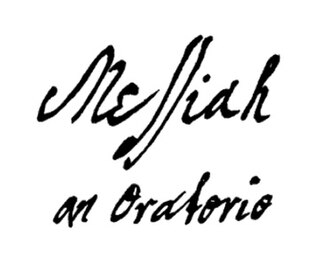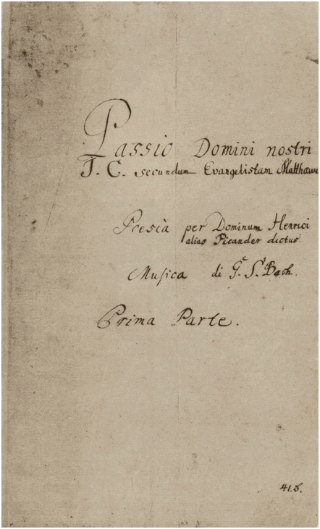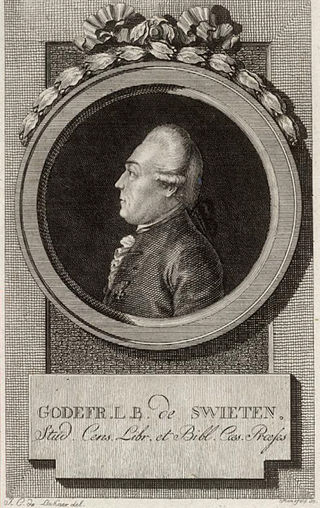A countertenor (also contra tenor) is a type of classical male singing voice whose vocal range is equivalent to that of the female contralto or mezzo-soprano voice types, generally extending from around G3 to D5 or E5, although a sopranist (a specific kind of countertenor) may match the soprano's range of around C4 to C6. Countertenors often have tenor or baritone chest voices, but sing in falsetto or head voice much more often than they do in their chest voice.

Messiah is an English-language oratorio composed in 1741 by George Frideric Handel. The text was compiled from the King James Bible and the Coverdale Psalter by Charles Jennens. It was first performed in Dublin on 13 April 1742 and received its London premiere a year later. After an initially modest public reception, the oratorio gained in popularity, eventually becoming one of the best-known and most frequently performed choral works in Western music.

Saint Cecilia, also spelled Cecelia, was a Roman virgin martyr and is venerated in Catholic, Orthodox, Anglican, and some Lutheran churches, such as the Church of Sweden. She became the patroness of music and musicians, it being written that, as the musicians played at her wedding, Cecilia "sang in her heart to the Lord". Musical compositions are dedicated to her, and her feast, on 22 November, is the occasion of concerts and musical festivals. She is also known as Cecilia of Rome.

Ode for the Birthday of Queen Anne is a secular cantata composed by George Frideric Handel to a libretto by Ambrose Philips, of which the first line, "Eternal source of light divine", provides an alternative title for the work. It was probably composed during January 1713 for a performance on 6 February 1713, although there is no record of the performance having actually taken place. Other catalogues of Handel's music have referred to the work as HG xlvi A; and HHA i/6.

The St Matthew Passion, BWV 244, is a Passion, a sacred oratorio written by Johann Sebastian Bach in 1727 for solo voices, double choir and double orchestra, with libretto by Picander. It sets the 26th and 27th chapters of the Gospel of Matthew to music, with interspersed chorales and arias. It is widely regarded as one of the masterpieces of Baroque sacred music. The original Latin title Passio Domini nostri J.C. secundum Evangelistam Matthæum translates to "The Passion of our Lord Jesus Christ according to the Evangelist Matthew".

Hail! Bright Cecilia (Z.328), also known as Ode to St. Cecilia, was composed by Henry Purcell to a text by the Irishman Nicholas Brady in 1692 in honour of the feast day of Saint Cecilia, patron saint of musicians.

The Choice of Hercules is an oratorio in one act by George Frideric Handel. Handel produced the score between 28 June and 5 July 1750. The first performance was given on 1 March 1751 at the Covent Garden Theatre, London with Cecilia Young as Virtue, Isabella Young as Hercules, and Thomas Lowe as attendant. The libretto is derived from the poem (1743) of Robert Lowth but revised, probably, by Thomas Morell.

Joshua is an oratorio by George Frideric Handel. It was composed in a month, from 19 July 1747 to 19 August 1747, six months before the beginning of the oratorio season. Joshua is Handel's fourth oratorio based on a libretto by Thomas Morell. The oratorio premiered on 9 March 1748 at the Covent Garden Theatre, London. Joshua is based on the Biblical story of Joshua as the leader of the ancient Israelites. The story follows the Israelites from their passage over the Jordan River into Caanan and through the Battle of Jericho. The work also includes a love story elaborated from a few hints in the Biblical narrative between Caleb's daughter Achsah and Othniel, a young soldier.

Alexander's Feast is an ode with music by George Frideric Handel set to a libretto by Newburgh Hamilton. Hamilton adapted his libretto from John Dryden's ode Alexander's Feast, or the Power of Music (1697) which had been written to celebrate Saint Cecilia's Day. Jeremiah Clarke set the original ode to music.

An Occasional Oratorio is an oratorio by George Frideric Handel, based upon a libretto by Newburgh Hamilton after the poetry of John Milton and Edmund Spenser. The work was written in the midst of the Jacobite rising of 1745–1746, the attempt to overthrow Handel's patrons – the Hanoverian monarchy under George II – and replace them with a Stuart restoration under Charles Edward Stuart, "Bonnie Prince Charlie". The Occasional Oratorio is unique among Handel's works which he labelled "oratorio" in that it does not tell a story or contain elements of a drama, but was intended as a defiant and patriotic rallying piece.

Alexander Balus is an oratorio by George Frideric Handel, named after its title character, the Seleucid king Alexander Balas. The work has three acts and was written in English. The period of the story is from 150 B.C to 145 B.C. The libretto is by Thomas Morell after the biblical book of 1 Maccabees.

The Brockes Passion, or Der für die Sünde der Welt gemarterte und sterbende Jesus, is a German oratorio, libretto by Barthold Heinrich Brockes, first published in 1712 and seeing 30 or so more editions over the following 15 years.

The Te Deum for the Victory at the Battle of Dettingen in D major, HWV 283, is the fifth and last setting by George Frideric Handel of the 4th-century Ambrosian hymn, Te Deum, or We Praise Thee, O God. He wrote it in 1743, only a month after the battle itself, during which Britain and its allies Hannover and Austria soundly routed the French.

Utrecht Te Deum and Jubilate is the common name for a sacred choral composition in two parts, written by George Frideric Handel to celebrate the Treaty of Utrecht, which established the Peace of Utrecht in 1713, ending the War of the Spanish Succession. He composed a Te Deum, HWV 278, and a Jubilate Deo, HWV 279. The combination of the two texts in English follows earlier models. The official premiere of the work was on 13 July 1713 in a service in St Paul's Cathedral in London.

Messiah, the English-language oratorio composed by George Frideric Handel in 1741, is structured in three parts. The wordbook was supplied by Charles Jennens. This article covers Part I and describes the relation of the musical setting to the text. Part I begins with the prophecy of the Messiah and his virgin birth by several prophets, namely Isaiah. His birth is still rendered in words by Isaiah, followed by the annunciation to the shepherds as the only scene from a Gospel in the oratorio, and reflections on the Messiah's deeds. Part II covers the Passion, death, resurrection, ascension, and the later spreading of the Gospel. Part III concentrates on Paul's teaching of the resurrection of the dead and Christ's glorification in heaven.

Messiah, the English-language oratorio composed by George Frideric Handel in 1741, is structured in three parts. This listing covers Part II in a table and comments on individual movements, reflecting the relation of the musical setting to the text. Part I begins with the prophecy of the Messiah and his birth, shows the annunciation to the shepherds and reflects the Messiah's deeds on earth. Part II covers the Passion in nine movements including the oratorio's longest movement, an air for alto He was despised, then mentions death, resurrection, ascension, and reflects the spreading of the Gospel and its rejection. The part is concluded by a scene called "God's Triumph" that culminates in the Hallelujah chorus. Part III of the oratorio concentrates on Paul's teaching of the resurrection of the dead and Christ's glorification in heaven.

Messiah, the English-language oratorio composed by George Frideric Handel in 1741, is structured in three parts. This listing covers Part III in a table and comments on individual movements, reflecting the relation of the musical setting to the text. Part I begins with the prophecy of the Messiah and his birth, shows the annunciation to the shepherds as a scene from the Gospel of Luke, and reflects the Messiah's deeds on Earth. Part II covers the Passion, death, resurrection, ascension, and the later spreading of the Gospel. Part III concentrates on Paul's teaching of the resurrection of the dead and Christ's glorification in heaven.
Carolyn Margaret Sampson is an English soprano in opera and concert. Specialising in historically informed performance, she has sung in Masaaki Suzuki's recording project of Bach cantatas and has appeared at the English National Opera.

Chandos Jubilate, HWV246, is a common name for a choral composition by George Frideric Handel. It was published as the first of the Chandos Anthems, and is known also as Chandos Anthem No. 1 and as Jubilate in D Major. A setting of Psalm 100, "O, be joyful in the Lord", it is the first in a series of church anthems that Handel composed between 1717 and 1718, when he was composer in residence to James Brydges, later 1st Duke of Chandos. The anthem was probably first performed at St. Lawrence's church, Whitchurch, near Brydges' country house. The work is written for a small ensemble of instrumentalists, solo singers and choir, and is approximately twenty minutes in length.

Der Messias, K. 572, is Wolfgang Amadeus Mozart's 1789 German-language version of Messiah, George Frideric Handel's 1741 oratorio. On the initiative of Gottfried van Swieten, Mozart adapted Handel's work for performances in Vienna.












